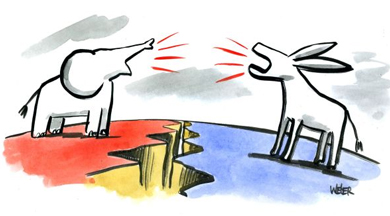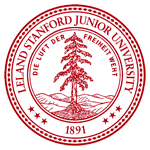Political
Polarization and Representation
 |
Bridging
the study of political behavior and political institutions, I have
analyzed the behavior of various political actors in an era of
polarized politics: Congress, the Supreme Court, and the mass public. I
am specifically interested in how the representativeness of
institutions affects public support for them.
|
Please
find links to his publications in this
research area
below:
Clark,
Chelsey S., Betsy Levy Paluck, Sean J. Westwood, Maya Sen, Neil
Malhotra, and Stephen Jessee. 2024. ``Effects of a US Supreme Court
Ruling to Restrict Abortion Rights.'' Nature Human Behaviour. https://doi.org/10.1038/s41562-023-01708-4 Guess,
Andrew, Neil Malhotra, Jennifer Pan, Pablo Barbera, et al. 2023.
``Reshares on Social Media Amplify Political News but Do not Detectably
Affect Beliefs or Opinions." Science. 381(6656): 404-408. Guess,
Andrew, Neil Malhotra, Jennifer Pan, Pablo Barbera, et al. 2023. ``How
Do Social Media Feed Algorithms Affect Attitudes and Behavior in an
Election Campaign?" Science. 381(6656): 398-404. Nyhan, Brendan, Jaime Settle, et al. 2023. “Like-Minded Sources on Facebook are Prevalent but not Polarizing." Nature. 620(7972): 137-144 González-Bailón,
Sandra, David Lazer, et al. 2023. “Asymmetric Ideological Segregation
in Exposure to Political News on Facebook." Science. 381(6656): 392-398. Jessee,
Stephen, Neil Malhotra, and Maya Sen. 2022. "A Decade-Long Longitudinal
Survey Shows That the Supreme Court Is Now Much More Conservative Than
the Public." Proceedings of the National Academy of Sciences. 119(24): e2120284119 Broockman, David, and Neil Malhotra. 2020. "What Do Partisan Donors Want?" Public Opinion Quarterly. 84(1): 104-118. Iyengar,
Shanto, Yphtach Lelkes, Matthew Levendusky, Neil Malhotra, and Sean
Westwood. 2019. "The Origins and Consequences of Affective
Polarization in the United States." Annual Review of Political Science. McConnell,
Christopher, Yotam Margalit, Neil Malhotra, and Matthew Levendusky. 2018. "The Economic Consequences of Partisanship in a
Polarized Era." American Journal of Political Science. 62(1): 5-18. (Erratum) (Updated Erratum) Huber,
Gregory A., and Neil Malhotra. 2017. "Political Homphily in Social
Relationships: Evidence from Online Dating Behavior." Journal of Politics. 79(1): 269-283. Kuo,
Alexander, Neil Malhotra, and Cecilia Hyunjung Mo. 2017. "Social
Exclusion and Political Identity: The Case of Asian American
Partisanship." Journal of Politics. 79(1): 17-32.Levendusky, Matthew, and Neil Malhotra. 2016. "Does Media Coverage of Partisan Polarization Affect Political Attitudes?" Political Communication. 33(2): 283-301. Levendusky, Matthew, and Neil Malhotra. 2016. "(Mis)perceptions of Partisan Polarization in the American Public." Public Opinion Quarterly. 80(S1): 378-391. Grose,
Christian R., Neil Malhotra, and Robert P. Van Houweling. 2015.
“Explaining Explanations: How Legislators Explain their Policy
Positions and
How Citizens React." American
Journal of Political Science. 59(3): 724-743.
Harbridge,
Laurel, Neil Malhotra, and Brian Harrison. 2014. “Public
Preferences for Bipartisanship in the Policymaking Process." Legislative Studies Quarterly. 39(3): 327-355.
Malhotra, Neil, and Stephen Jessee. 2014. “Ideological Proximity and
Support for the Supreme Court." Political
Behavior. 36(4): 817-846.
Krosnick, Jon A., Neil Malhotra, and Urja
Mittal. 2014. “Public
Misunderstanding of Political Facts: How Question Wording Affected
Estimates of
Partisan Differences in Birtherism." Public
Opinion Quarterly. 78(1): 147-165. Rothschild, David, and Neil Malhotra. 2014. "Are Public Opinion Polls Self-Fulfilling Prophecies?" Research and Politics. 1(2): 1-10.
Jessee, Stephen, and Neil Malhotra. 2013.
“Public (Mis)perceptions of
Supreme Court Ideology: A Method for Directly Comparing the Positions
of
Citizens and Justices." Public
Opinion Quarterly. 77(2): 619-634.
Malhotra, Neil, and Elizabeth Popp. 2012.
“Bridging Partisan Divisions
over Anti-Terrorism Policies: The Role of Threat Perceptions." Political Research Quarterly. 65(1):
34-47.
Harbridge, Laurel, and Neil Malhotra. 2011.
“Electoral Incentives and
Partisan Conflict in Congress: Evidence from Survey Experiments." American Journal of Political Science.
55(3): 494-510.
Jessee, Stephen, and Neil Malhotra. 2010.
“Are Congressional Leaders
Middlepersons or Extremists? Yes." Legislative
Studies Quarterly. 35(3): 361-392. Malhotra, Neil, and Connor Raso. 2007. “Racial Representation and U.S.
Senate Apportionment." Social
Science Quarterly. 88(4): 1038-1048.
|






